I’ve been playing the newest Bioware multiplayer game, Anthem, for a week now and I’m enjoying it immensely. It’s stunningly beautiful, easy to get into and incredibly fun to play. The foundational world-building concepts are a fresh take on the magical-artifacts-of-an-ancient-civilization trope with a musical twist that I find irresistible. Despite the occasional lapses in logic, the narrative is engaging and well-executed. Among the substantial cast of characters, not all are rendered with equal depth, but they are all competently written and voiced. Where Anthem doesn’t shine, it’s decent, and there’s next to nothing in it that annoys me. That’s quite an accomplishment! My overall feeling is that this is the game Mass Effect Andromeda was supposed to be, if it only had the time and nourishment to mature properly.
Echoes of Mass Effect can be felt in Anthem in many ways. It’s a third-person shooter with abilities that can set up and trigger combos. If you’ve played any of the Mass Effect games, you’ll feel a familiarity from the beginning. The javelin exo-suit you start with, the Ranger, is basically the Human Soldier from Mass Effect 3 Multiplayer: it’s meant to shoot things from afar, it can take a decent amount of punishment, and it comes with grenades and concussive shot. I think I had more difficulty getting the hang of Andromeda than of Anthem, but people who played a lot of Andromeda will find the jet-powered flying and maneuverability more familiar than I have. Considering the break-neck speed of flying, it’s surprisingly intuitive, easy to master and quick to become an addiction. Easily the most enjoyable means of transportation in all my gaming experience, especially given the amazing outdoors environments.
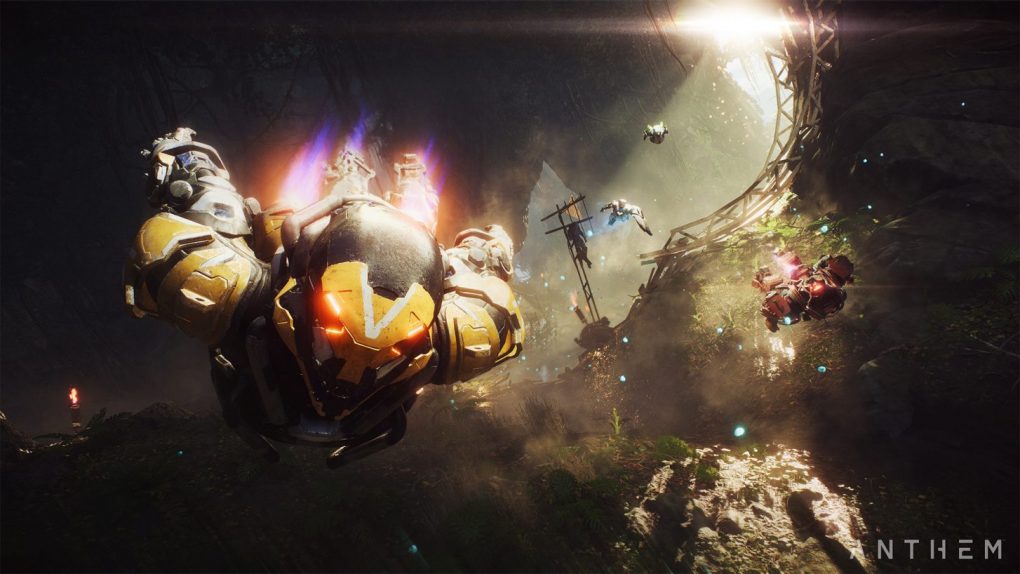
Anthem is set in a an unfinished world. Its creators, the Shapers, abandoned it, leaving behind their unfathomable instruments. These occasionally become unstable and wreck havoc of varying proportions. Small disturbances may attract aggressive wildlife or spawn otherworldly monsters; big ones may change the lay of the land or even the laws of nature. Humans shield their cities with monumental fortifications and only go outside their walls in heavily armored vehicles and exo-suits. Only Freelancers make it their business to roam the wilds and intentionally seek out Shaper relics and other trouble. You play as one of them.
One of the very few annoyances I had with Anthem happened within the first five minutes of the game, so I suppose it won’t be much of a spoiler to describe it. Namely, dealing with Shaper relics and the mess they sometimes make is what Freelancers do. In the intro, we are told that not long ago, such a mess arose the likes of which had never been seen before. It was named the Heart of Rage and it took shape of an immense storm that literally rained monsters. A large number of Freelancers went into the storm to try and contain it. Most of them never came out. You’re thinking: wow, such brave; much heroic. But no. What the game tells you instead, is that after the Heart of Rage, people lost their faith in the Freelancers and started shunning them.
What? Why? If the Freelancers had somehow caused the Heart of Rage, or if they threw helpless civilians in it to figure it out, or if they collectively refused to go take care of it — then it might make sense. But to be shunned for dying on duty? It’s nonsense. Worse still, it’s needless nonsense. Other than a few stray references to how, as a Freelancer, one of only a handful to have been in the Heart of Rage and survived, and one of the few remaining in general, you have a duty to restore the faith of the people in your shunned faction by tirelessly solving their problems — nothing requires or depends on this.
Big-money games should hire book editors to take a look at their narrative before setting it stone and baking it into the engine. This kind of blunder? Eminently fixable.
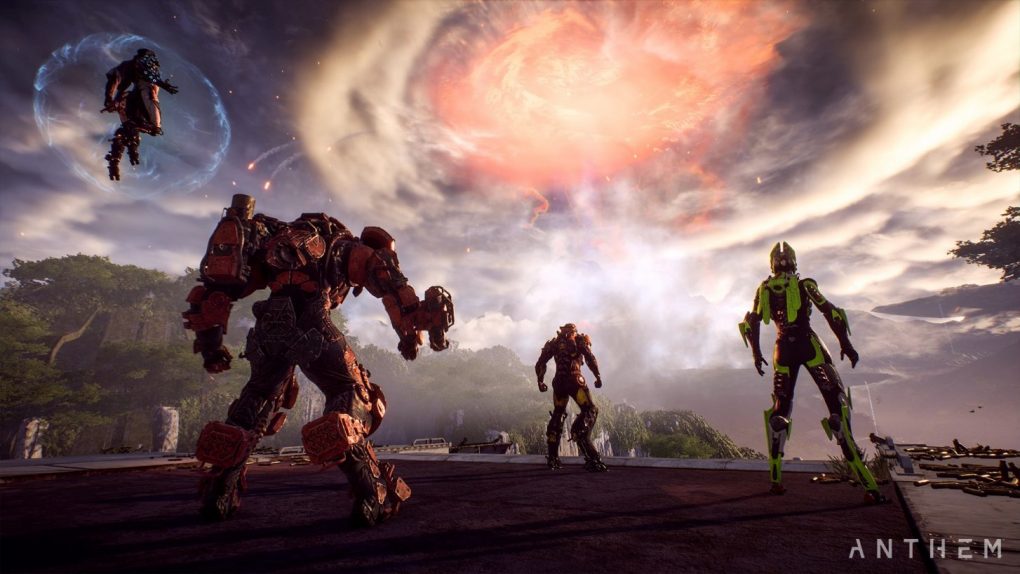
Ignoring this utter failure at common sense, I wholeheartedly approve of the setup where being a problem-solver is your job. You’re trained for it, you have a powerful exo-suit designed for it, and the character you role-play is mostly positive and enthusiastic about it. This takes care of so many tiny inconsistencies so many narrative-rich games suffer from due to the inherent incompatibility of a strong plot and an open world full of diversions.
My favorite example of this is The Elder Scrolls IV: Oblivion, where you’re placed in a sprawling world full of carefully crafted locations, characters and stories that have no tie whatsoever to the burningly urgent plot to save the fucking world quickly before it’s destroyed. Of course, there’s no actual time limitation: you’re free to take as many hundreds or thousands of real-life hours and months and years of in-game time to finish (or not finish) the main plot. But this bothered me. It actively hampered my ability to fully enjoy that game, and many others with a similar built-in contradiction.
On the other side of the same coin, the nameless heroes of all TES games, as well as the named ones from the Mass Effect and Dragon Age series are prone and expected to take on a myriad of incredibly stupid and insignificant tasks unrelated to whatever disaster of biblical proportions they are chosen to prevent on their hero journey, partly in order to show off that huge, lovingly created world. This bothers me as well.
Both problems are solved with one sweep by making random quests your job. Nothing is too stupid to do if doing it will keep you fed and sheltered. Even more so if you’re uniquely qualified for it. The Witcher games could do it because Geralt is, well, a witcher. Anthem does it even better because 1) it doesn’t emphasize an urgent central narrative, 2) you’re involved with the central narrative already and 3) almost everything you’re asked to do is related to it. So there’s never a sense of, oh god, why would anyone expect me to do this crap; nor of, hey, aren’t I supposed to be doing those Really Important Things instead of exploring this really cozy cave? I can’t exaggerate how liberating this is.
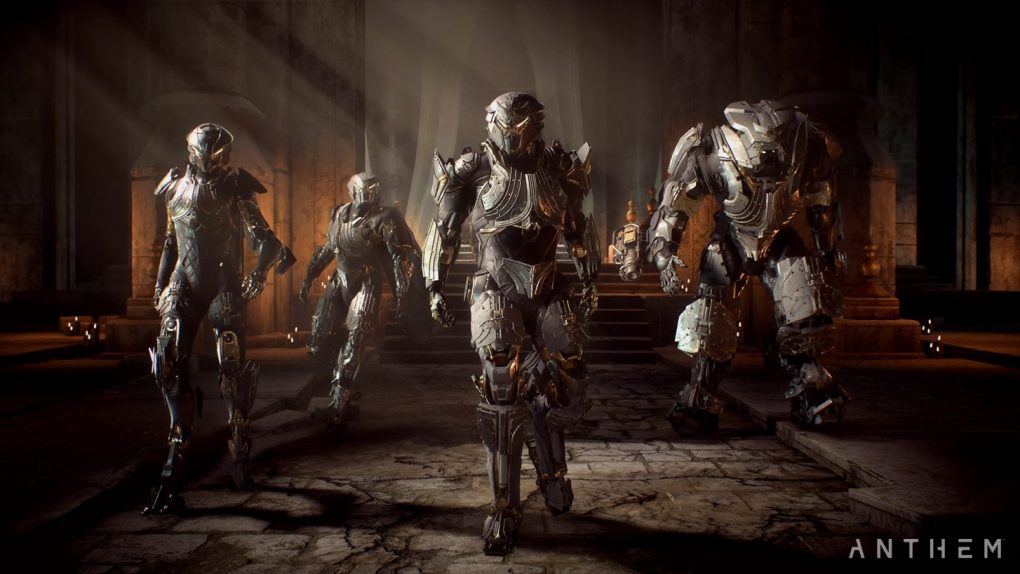
After 26 hours in the game, I haven’t finished it yet. I’ve heard it criticized for being too short and I suspect it has to do with its coop nature. Outside freeplay (where you can fly around the open world without a specific aim and explore it at your leisure), every mission is available both for public and private coop; and in “private” you can play solo. This is what I’ve been doing. Even on the easy difficulty, the fights aren’t entirely trivial when you’re on your own, and I imagine playing alongside other people would proportionally shorten all encounters.
Playing alongside other people has many shortcomings, though, and Anthem has introduced one mechanic I’ve not seen before that makes coop play with randoms especially unattractive. Every mission has stages and they are often arranged in different locations. The beginning of a stage may be triggered by the end of the previous stage or by entering a certain area. This is where the trouble with randoms comes from. The eager, busy random who’s got stuff to do and can’t be bothered to wait for us noobs to pick flowers, admire that lovely waterfall by the side of the road, or fight optional enemies, will take off ahead of everyone else and trigger a new stage of the mission — and Anthem will “conveniently” teleport everyone to the new stage. This mechanics is present when running solo too; in some missions the game gives you zero margin for taking your time with things. But it’s far more tangible and annoying when perpetrated by the impatient others.
I hate speeding in games. When I sense that people I’m playing with are in a hurry (usually related to farming), I’m liable to quit immediately. Anthem provides players with a mechanism to force their tempo on others and that’s a horribly, horribly damaging thing. Why did the developers think this would be a good idea? It will only spur everyone to run through content at maximal speed without paying any attention to it. I can’t imagine how shitty the main story missions must seem to poor people who have, for some reason, decided to play them with randoms. Teleporting to mission area will rudely interrupt key exposition and render entire sections of the narrative nonsensical, not to mention cut content shorter than it was intended.
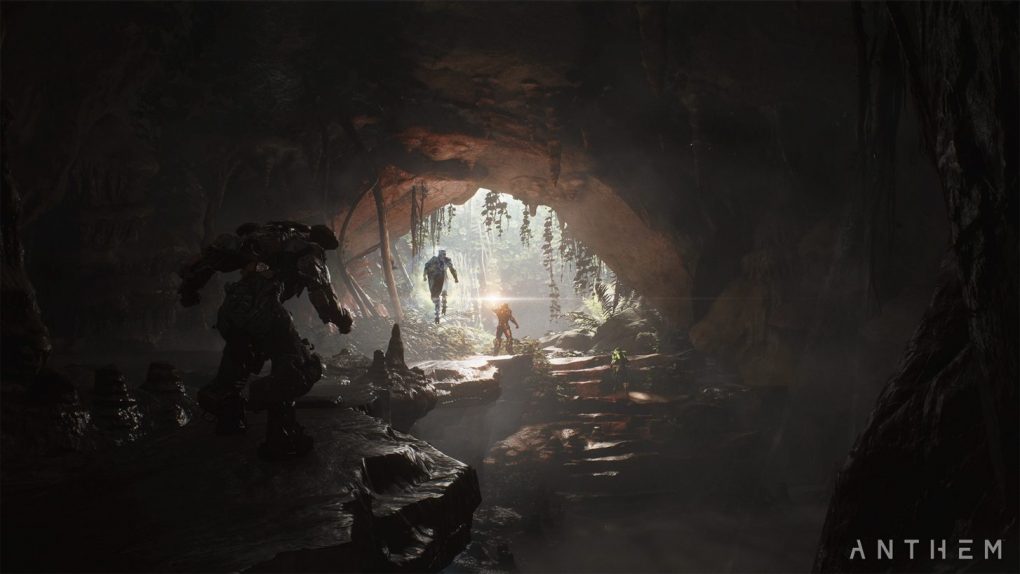
Thankfully, solo is an option. In that regime, Anthem is remarkably well-paced. Fort Tarsis is strewn with NPCs who will either give you tasks or engage you in entirely optional, dialog-based mini-quests where you resolve some small local issue. After a round of conversation, you typically fly out and do some fighting. When you come back, you can continue with the next stage of the conversations, and so on. I’m especially fond of the stark contrast between the hectic speed of flying and fighting outside the walls and the slow pace at which you walk around the Fort. It feels like a well-deserved moment of peace and quiet after an exhausting and dangerous ordeal. Out there is chaos. Inside, is home.
Anthem has so far impressed me as a game with unusually humane themes. Most characters are ordinary, small people. There are no Flemmeths and Aria T’Loaks, and your Freelancer is no Hawke or Shepard. And thank dog for that! The villain seems fairly melodramatic, but he also seems fairly competent, so I’m reserving my judgment for now. Among the cast, female characters are a large majority. One of the main characters has a physical disability and more than one is struggling with some sort of mental health or social adjustment issue. I believe one of the few male characters is gay but I’m not sure. I was pleasantly surprised by the ethnic diversity of characters, present also in the choice of your own character’s appearance. Very well done.
I heard criticisms of Anthem’s dialogs and I frankly can’t understand what’s there to critique — unless the complaints are really about missing Aria T’Loaks, Flemmeths, Shepards and Hawkes. So far I’ve not stumbled on any bad dialog or any incompetent piece of writing in general. To be fair, none of it deathless prose either: it’s all straight-forward, down-to-earth stuff that’s perfectly appropriate for the people who deliver it. I’ve developed mild attachments to nearly all the recurring characters, which would not have happened if their dialog was bad. To be fair some more, none of them are Anders or Garrus Vakarian. There will be no heart-twisting romances here.
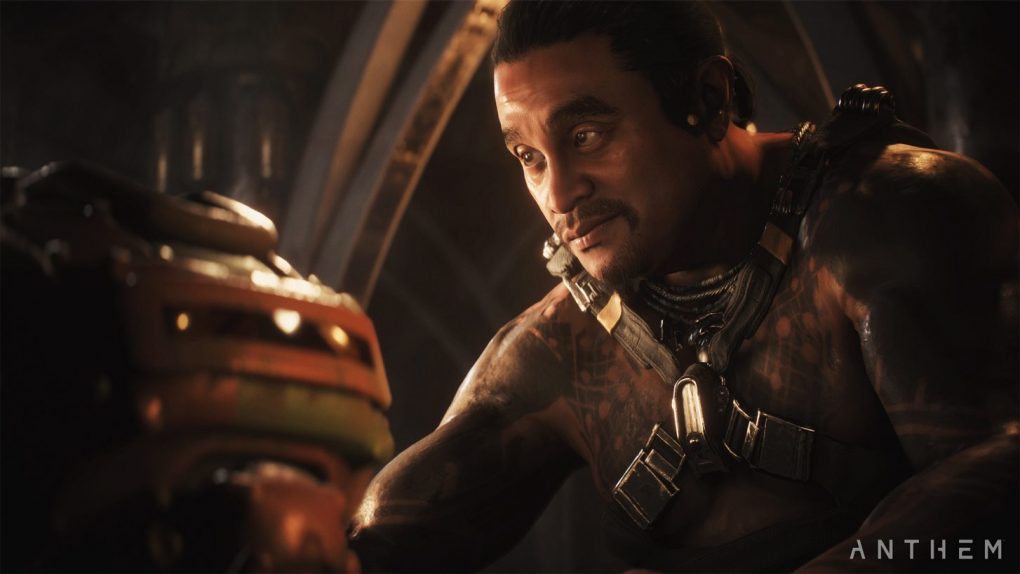
Which brings me to yet another critique I’ve heard and can’t relate to. People seem disappointed with Anthem’s RPG elements. Well — yeah. Anthem is hardly an RPG. Hell, Mass Effect was hardly an RPG. In Anthem, you gain levels from earned experience — and that’s about it. There are no skill trees — there aren’t even any skills in the strict sense of the word. In dialog, you get two options: one slightly affirmative, the other slightly negative, and sometimes the choice of tone will turn out to be significant. But not on a game-changing level, I think. It’s a shooter-looter, like Warframe, and as far as I know, no one ever promised otherwise. What little it has in terms of RPG elements is pure bonus.
The question that remains open is what will happen when I finish the main plot. Are freeplay and strongholds going to be attractive enough to keep me playing? Will future acts (like mini-expansions, from what I gather) bring enough new content to bring me back to it if I stop? I know I haven’t had enough of it yet by far. Right now I would enjoy picking flowers in freeplay just for the pleasure of seeing the sights. Anthem is hands-down the most beautiful game I have ever seen. And I haven’t yet played this seriously with friends. That might change my opinions on more than one aspect. We’ll see.
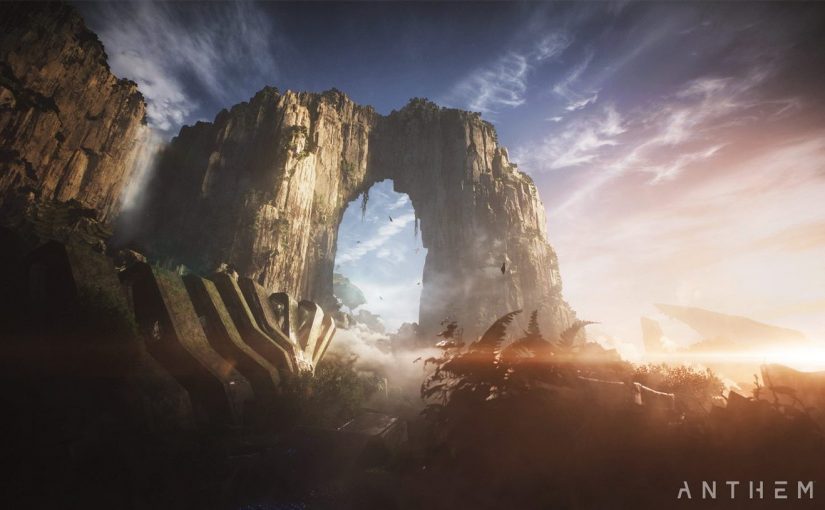
One thought on “Anthem: First Impressions”